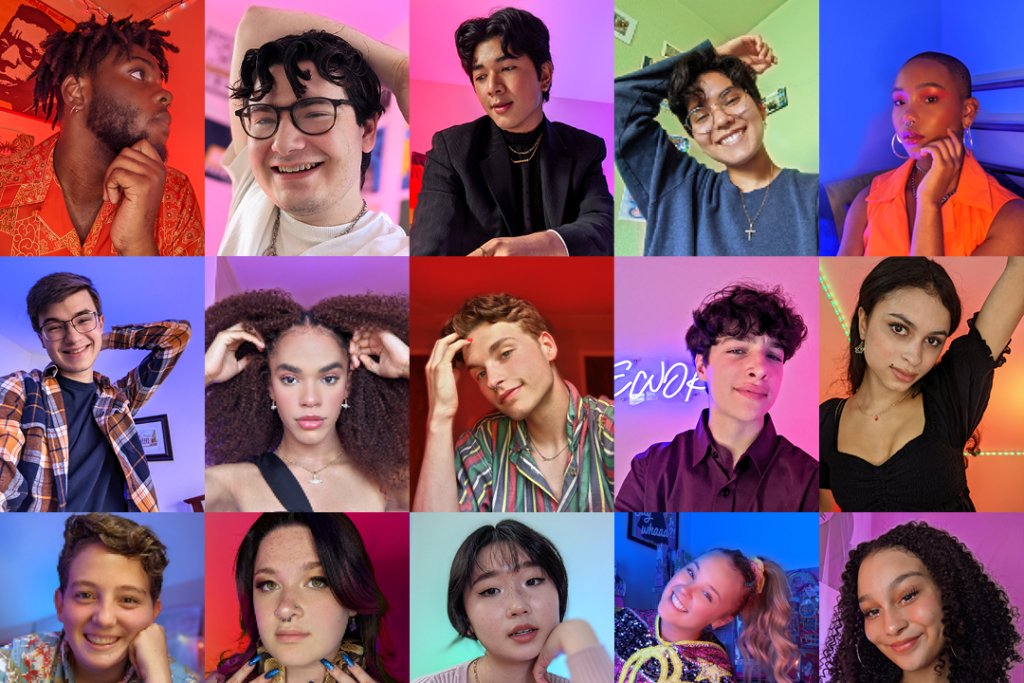Blog Post
Nearly 30% of young Christians and 40% of Gen Zers identify as LGBT. Here’s what that means.
By Jonathon Van Maren
In October 2020, I wrote an essay examining several different subsets of data that highlighted how far we have moved into the West’s post-Christian future. Staggering numbers of young people are now identifying as LGBTetc, and depressing majorities of those who identify as Christian are biblically illiterate and reject key tenets of traditional orthodoxy. We are witnessing a sea change, and no community or group is exempt. Social media is now omnipresent, and thus the walls traditional communities have built to keep the worst aspects of secular culture out have toppled in less than a generation. Most young people are now part of the same digital culture, and the networks they build are impervious to adults.
The cultural cache that once came with identifying as Christian is also rapidly disappearing. For decades, pervasive cultural Christianity resulted in polling numbers that comforted Christian leaders, making it appear as if there was still a Christian majority. Most of those polled, however, had long abandoned any form of Christian practice and were merely identifying as Christian as a nod to their heritage or culture. I didn’t meet a Catholic who actually attended church until well into university—and I often think of Rod Dreher’s story about his father getting angry when he became Catholic. “The Drehers are Methodist!” he angrily told his son. “But you never go to church!” his bewildered son replied. “The Methodist Church is the church I don’t go to!” his father thundered back.
As Christianity loses its cultural dominance and becomes the creed of the despised minority and the LGBT revolutionaries gain cultural dominance, we are witnessing a mass defection from one side to the other. The rapidly rising number of “nones”—those who identify with no religious tradition—are often people who simply stop identifying as cultural Christians as the label becomes inconvenient rather than nostalgic. Identifying as LGBT is trendy and guaranteed to get the approval of one’s peers and the social media hordes who pass as such these days. That’s why a Daily Mail reported a few years back that high school girls were worrying that they are “dumb and boring” if they are straight and why the number of “trans kids” is skyrocketing and Dr. Lisa Littman is referring to the trend as a “peer contagion.”
A perfect example of this would be disgraced former Governor Andrew Cuomo’s daughter Michaela Kennedy-Cuomo first coming out as “queer”—a word that means basically nothing now beyond your desire not to be known as heterosexual—and then announcing she was “demisexual.” If you haven’t heard of this new label, it apparently refers to people who are only sexually attracted to those they’re emotionally involved with, or something. So there’s now a term for not being promiscuous, and it is a specific identity that bails folks like Kennedy-Cuomo out of having to identify as straight, which she obviously is. She just wants to be interesting on social media and get with the “in-crowd” while still getting with guys.
Veteran gay rights activist Andrew Sullivan has even noted his suspicion over the fact that the vast majority of people identifying as “bisexual” are actually in relationships with opposite-sex partners, thus making it likely that many are simply choosing to identify on the LGBT spectrum while remaining exclusively in heterosexual relationships. This unfolding scenario — that being “queer” is cool and being straight is square — surely exceeds the wildest dreams and aspirations of the most radical LGBT activists. “Queer” has gone from an epithet (famously leveled by William F. Buckley at gay writer Gore Vidal on live TV) to a badge on honor. How’s that for a successful revolution? The rainbow blitzkrieg has sliced through every layer of society in mere decades.
All of that brings me to a report by Paul Bond in Newsweek. The trends, as it turns out, are getting worse:
Thirty percent of Millennials identify as LGBTQ, according to a soon-to-be released study that is based on scientific polling data. Among Christians the numbers were lower—but only slightly, with just under 30 percent of Millennial Christians identifying as LGBTQ…The pollster who worked on the new study, George Barna, attributes the unusually high number he found to social and news media coverage that makes it “safe and cool” for young Americans to identify as LGBTQ—whether or not it represents their actual sexual orientation.
“It’s a subset of a larger issue, that this is a generation where three out of four are searching for meaning. This is a group that doesn’t have a reason to get out of bed in the morning,” Barna says. “Therefore, the LGBTQ identity gives them comfort. A lot of this generation claim to be moving in that direction, but there’s a big difference between claiming the identity and living the lifestyle.”
The poll looked at so-called Millennials, defined as someone born from 1984-2002, which is about 78 million individuals representing a quarter of the U.S. population. Among Millennials, 30 percent identify as LGBTQ, more than three times that of the rest of the adult population, and when the researchers broke out the youngest of the group, ages 18-24 (which some call Gen Z), they found 39 percent called themselves LGBTQ.
Barna produced the 124-page study in conjunction with the Cultural Research Center at Arizona Christian University and Foundations of Freedom, a non-profit entity that promotes traditional American values.
The results differed significantly from a February Gallup poll that showed just 5.6 percent of U.S. adults of all ages are not “heterosexual or straight,” though that poll said that 7.6 percent of respondents refused to answer the question and another 5 percent said they had “no opinion” as to whether they are heterosexual or straight. The Gallup survey concluded that one in six Americans ages 18-23 were gay, lesbian, bisexual or transgender.
Barna’s poll is based on a sampling of 600 respondents representing Millennials weighted for factors such as geographic location, race and gender who took an average of 17 minutes each to answer 71 questions. The poll didn’t ask directly whether the respondent was gay or straight, asking instead to choose an answer to the question: “Thinking about your commitments, would you describe yourself as ….”
Six responses were allowed, with the one garnering the most “yes” answers (75 percent) among Millennials being: “Searching for purpose in your life,” followed by 74 percent who answered: “Believe all religious faiths are of equal value.”
“An American patriot” was next at 55 percent, followed by 54 percent who answered, “Often feel anxious, depressed or unsafe” and 52 percent who answered, “Deeply committed to practicing your faith.”
“Prefer socialism to capitalism” was next at 48 percent and “LGBTQ” was last at 30 percent. The order is similar among the 18-24 demographic that has LGBTQ nine percentage points higher.
“It fits into the larger narrative. Millennials are a group that has trouble creating lasting, meaningful relationships,” says Barna. “If their sense is that some of the people they want to be friends with — and a group they want to be accepted by — is LGBTQ, then they’ll identify with them. It’s about image, belonging and acceptance.”
Also, a high percent of Millennial Christians (27 percent) and born-again Millennial Christians (28 percent) describe themselves as LGBTQ, even though many faith groups endorse only heterosexual marriage and are sometimes dismissed as homophobic by gay rights advocates.
While the large number of Millennials who identify as LGBTQ is attention-grabbing, Barna says what he found “really interesting is that 40 percent of them fall into the category of what we call the ‘don’ts;’ they don’t believe that God exists, they don’t care if God exists. That’s the highest we have seen for any generation, ever.”
“Why is it when previous generations were able to figure out why life was worth living, this one isn’t figuring it out?” he asks. “It has to do with the spiritual changes in America. They don’t buy into the Bible, they don’t trust God, they don’t believe in Jesus, and politics have codified that into law, and the media is a major part of it.”
Conservatives are riding high politically at the moment, with the GOP scoring key victories in states like Virginia on the backs of parents who are finally angry enough to push back. Conservative media giants like The Daily Wire have hosted events with titles such as “Turning of the Tide.” While I’d like to be that optimistic, the reason I’m not is because the data indicates that the upcoming generations are not only post-Christian, but actively hostile to Christianity. As I wrote a few weeks back, the success of the LGBT revolution has illustrated the fact that majorities don’t matter and that our “woke” moment is just beginning—and isn’t even close to over. They still own the culture and all of the institutions. We’ve merely scored a few political victories.
We’ve been here before. After the Sixties came the backlash, and we had Ronald Reagan and the Religious Right and Operation Rescue and it seemed, for a time, like Christians and conservatives were reclaiming the country. But it was merely a reprieve. Then came Clinton, and the failed impeachment, and the realization that the Moral Majority didn’t exist. There are still many, many conservatives—but at the moment, progressives and revolutionaries have utterly captured the minds and the imaginations of the upcoming generations through social media, entertainment, the schools, and the academy. Unless that changes, our trajectory is set.
The culture is lost. Building robust Christian sub-cultures that are resistant to the tides of liquid modernity is the way forward.








